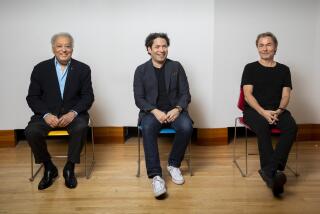MUSIC REVIEW : Pianist Zelka Proves the Master of a Difficult Program
LA JOLLA — When pianist Charlotte Zelka sat down at Mandeville Auditorium’s mighty Bosendorfer on Sunday afternoon, her demure appearance gave not the slightest hint of the rigorous, abstract program she was about to undertake. In her long print dress and close-cropped white hair, she looked like everyone’s favorite piano teacher about to demonstrate a few Chopin nocturnes and Brahms intermezzi.
Instead, the Pasadena pianist performed four formidable 20th-Century works, the esoteric fare usually offered by disheveled, slightly misanthropic graduate students. If Zelka’s collection of atonal essays by Artur Schnabel, Frank Stemper, Frank LaRocca and Ernst Krenek strained the attention of even the most stalwart admirers of the genre, she nevertheless proved her ability to translate the most prolix scores with disarming dispatch and apparent ease.
Nothing on Zelka’s program came close to the scope or profundity of Krenek’s Fifth Piano Sonata, written for the performer in 1950. Her assurance in traversing the three-movement sonata’s craggy landscape, the work’s wealth of musical ideas, and the dark, resonant sound of the Bosendorfer combined to make a rewarding music journey. The composer was on hand to lend his approval to Zelka’s keyboard wizardry.
Schnabel’s “Piece in Seven Movements” was disappointing in every respect. These rhapsodic meanderings exuded a surface complexity, but lacked substance. With no center of gravity, no clear organizing principle, these movements were as enervating as they were unrelenting.
Though Zelka ably coped with the set’s digital requirements, it was difficult to imagine why anyone would devote the effort to bring this work to life. If it is true that the intrepid and masterful keyboard interpreter of Beethoven and Brahms really wanted to compose rather than perform, we can only be happy that fate pushed Schnabel onto the concert stage and into the recording booth.
More to Read
The biggest entertainment stories
Get our big stories about Hollywood, film, television, music, arts, culture and more right in your inbox as soon as they publish.
You may occasionally receive promotional content from the Los Angeles Times.










